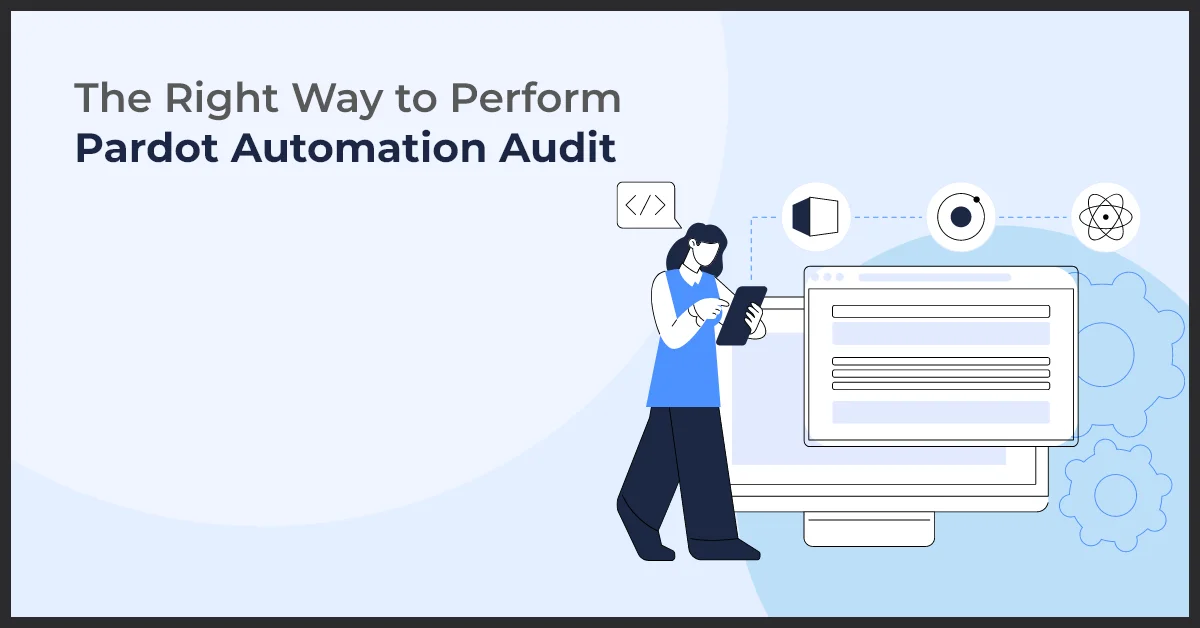The Right Way to Perform Pardot Automation Audit

Published on: October 22, 2021
Updated on: October 25, 2024
1904 Views
- Pardot
11 min read
An Expert Guide to Pardot Automation Audit: Maximizing Marketing Efficiency
As the world of digital marketing evolves at a breakneck pace, businesses are turning to Pardot – a powerful marketing automation platform that helps streamline and optimize their marketing efforts. With its array of features, including lead management, email marketing, and lead nurturing, Pardot has quickly become a go-to solution for businesses looking to supercharge their marketing campaigns.
However, implementing Pardot is just the first step towards marketing automation success. To ensure optimum performance and ROI, conducting regular Pardot automation audits becomes crucial. This process involves a comprehensive evaluation of your Pardot setup, workflows, and strategies. By thoroughly examining your automation processes, you can identify any discrepancies, improve efficiency, and unlock Pardot's full potential to drive results.
“Ask the right questions if you are to find the right answers”
- Venessa Redgrave
Salesforce Pardot has earned the reputation of being a reliable Marketing Automation tool among marketers who invest in digital marketing. It comes from the house of Salesforce and is used by enterprises of different sizes across the globe.
Since Pardot comes at a considerable cost, it is imperative that we keep a tab on whether we are utilizing it to its full potential or not.
To measure the effectiveness of your Pardot automation, you need to ask yourselves some questions related to different aspects. The answers will help you determine which areas of operation need improvement to boost productivity in marketing automation functions.
Let’s look at the areas you need to focus on:
What is a Pardot Automation Audit?
A Pardot automation audit is a comprehensive analysis of your marketing automation processes within the Pardot platform. It involves a thorough evaluation of your Pardot account to identify areas of improvement and ensure that your automation strategies are optimized for maximum efficiency.
By conducting a Pardot automation audit, businesses can gain valuable insights into their marketing automation workflows and identify any gaps or inefficiencies in their processes. This allows them to make informed decisions and take necessary actions to improve their overall marketing automation performance.
Furthermore, a Pardot automation audit helps businesses to optimize their marketing automation processes, enabling them to achieve better results in terms of lead generation, nurturing, and conversion. It provides businesses with a clear understanding of how their automation strategies are performing and allows them to fine-tune their campaigns for better outcomes.
The key benefits of conducting a Pardot automation audit include:
- Identifying areas for improvement: A Pardot automation audit helps businesses pinpoint areas that need attention or adjustments in their automation workflows. This enables businesses to enhance their marketing automation strategies and achieve better results.
- Enhancing efficiency: By analyzing the existing automation processes, a Pardot automation audit helps businesses identify and eliminate any redundant or ineffective steps. This streamlines the automation workflows and improves overall efficiency.
- Optimizing lead nurturing: A Pardot automation audit allows businesses to assess the effectiveness of their lead nurturing campaigns. It helps identify any gaps or missed opportunities in the nurturing process and enables businesses to implement targeted improvements.
- Increasing ROI: Through a Pardot automation audit, businesses can uncover inefficiencies that may be negatively impacting their return on investment. By addressing these issues, businesses can improve their overall marketing automation performance and achieve a higher ROI.
In conclusion, a Pardot automation audit is a valuable process that helps businesses optimize their marketing automation strategies within the Pardot platform. It allows businesses to identify areas for improvement, enhance efficiency, optimize lead nurturing, and increase their return on investment. By conducting a Pardot automation audit, businesses can unlock the full potential of their marketing automation efforts and achieve better results.
Understanding the Audit Process
When conducting a Pardot Automation Audit, it is essential to follow a structured and systematic approach. This ensures that all aspects of your Pardot instance are thoroughly evaluated and any areas of improvement are identified. The audit process consists of two main stages: Pre-Audit Preparation and Audit Execution.
A. Pre-Audit Preparation
Before beginning the audit, it is crucial to set clear objectives and goals. This helps in defining the scope of the audit and ensures that the assessment is focused. Additionally, identifying key stakeholders involved in the audit process ensures that all relevant parties are aware of their responsibilities and expectations.
Gathering relevant data and documentation is another critical aspect of the pre-audit preparation. This includes information such as Pardot instance configuration, Salesforce CRM integration details, lead scoring rules, grading, and assignment rules. The data collected will serve as a baseline for the audit and help in identifying any deviations or areas of improvement.
B. Audit Execution
1. Reviewing Pardot Configuration and Setup
During this stage, the configurations and settings of your Pardot account will be thoroughly examined. This includes evaluating account settings, email templates, designs, and content. Additionally, the integration of your Pardot instance with Salesforce CRM will be assessed to ensure seamless data transfer and synchronization.
Validation of lead scoring rules, grading, and assignment rules is also a crucial part of the audit process. This helps in determining the effectiveness of your lead management processes and identifies any gaps or areas for improvement.
2. Evaluating Automation Rules and Workflows
The automation rules and workflows in your Pardot instance play a significant role in streamlining your marketing and sales processes. As part of the audit, existing automation rules and workflows will be analyzed to evaluate their effectiveness and efficiency.
The assessment will also include a review of email automation sequences and drip campaigns. This helps in identifying opportunities for optimization and personalization of your email marketing efforts. Additionally, engagement programs will be identified and reviewed to ensure effective nurturing of leads throughout the customer journey.
3. Assessing Email Marketing Practices
Email marketing is a crucial component of any marketing automation strategy. An audit of email marketing practices includes reviewing email templates, designs, and content to ensure consistency and adherence to branding guidelines.
An analysis of email deliverability and open rates helps in identifying any deliverability issues and suggests measures to improve email performance. Furthermore, the examination of email preference management ensures compliance with legal regulations and provides a seamless experience for your subscribers.
4. Analyzing Reporting and Analytics
Reporting and analytics provide valuable insights into your marketing automation efforts. During the audit, key metrics and performance indicators will be evaluated to assess the effectiveness of your campaigns and strategies.
The assessment will also include reviewing reporting capabilities and ensuring data accuracy. This helps in identifying any gaps or limitations in your reporting processes and enables better decision-making based on reliable data.
By analyzing the reporting and analytics, areas that require improvement can be identified. This allows you to make data-driven optimizations and enhancements to your marketing automation practices.
Understanding the audit process is crucial for a successful Pardot Automation Audit. By following a systematic approach and thoroughly evaluating key aspects of your Pardot instance, you can identify areas for improvement and optimize your marketing automation efforts.
Benefits and Outcomes of a Pardot Automation Audit
An effective Pardot Automation Audit can provide numerous benefits and outcomes that can significantly improve your marketing strategy and overall business performance. Here are some of the key advantages you can expect:
- Improved marketing efficiency and campaign effectiveness: By assessing your automation processes, you can identify bottlenecks and inefficiencies, allowing you to optimize your campaigns and ensure maximum efficiency.
- Enhanced lead generation and lead nurturing processes: A Pardot Automation Audit helps you identify gaps in your lead generation and lead nurturing processes, enabling you to develop more targeted and personalized marketing campaigns that result in higher conversion rates.
- Increased ROI through better utilization of Pardot features and tools: By evaluating your usage of Pardot features and tools, the audit can uncover opportunities for improvement and help you leverage the full potential of the platform, ultimately leading to a higher return on investment.
- Identification of areas for optimization and process streamlining: Through a comprehensive assessment of your automation processes, the audit can pinpoint areas for optimization and streamline your workflows, eliminating unnecessary steps and improving overall efficiency.
By undergoing a Pardot Automation Audit, you can gain valuable insights and recommendations that will empower you to take your marketing automation strategy to the next level, driving greater success for your business.
Performance of Web Forms
Web forms are an important tool that makes sure that relevant leads are entering our system. If our web forms are not relevant, lack comprehensiveness, and do not seek information that is critical to our business, we may not be able to target our potential customers. In this case, you must ask yourself:
- How can you improve the forms? Can you get more responses if they are shortened? Do you need to update the forms to reflect your new business model/ service offerings?
- Are the forms working properly on all devices?
- Are confirmatory messages being delivered immediately to the lead mailbox?
- Are these forms good enough to match with corporate branding?
- Are the forms engaging and encouraging your leads to fill them?
Note - By using progressive profiling, we can keep getting updates regarding leads.
Data Hygiene and Lead Segmentation
It is very important to check whether our database is up-to-date or not. Data duplication can lead to unorganized communication to leads. It will further hamper the data segmentation which is the core to informed and targeted lead nurtures.
If data is not well organized and hygienic, lead scoring will also result in wrong selections and you may miss important and low hanging customers. You need to find answers to the following questions:
- Are you using techniques to store accurate and reliable data?
- Are the criteria to generate these lists updated and match our perspective?
- Are you using the right set of rules to segment the database?
- Can you improve the segmentation process by adding behavioral aspects? Are segmentation rules matching with your buyer personas which is the base for marketing outreach?
- Are you setting up very strict rules for segmentation which is putting potential buyers out of your radar?
Lead Scoring
Lead scoring refers to the process of allotting scores to customers in the sales funnel by analyzing their response to your communication. Lead scoring helps sales teams to identify the most promising leads and close deals with them asap.
Here, you may want to ask the following questions:
- Are all content pages aligned with the campaign objectives?
- Are scores allocated to these pages realistic?
- Do the existing scoring rules relate accurately with buying signals?
- Are the buyer persona profiles and lead scoring delivering out a good conversion rate?
Read More: Improve Your Lead Nurturing Process With Pardot Automation
Communication Frequency
Communication frequency plays a major role in winning brand loyalty and the biggest challenge lies in setting up rules to schedule recurring messages. It is very important to refrain from sending frequent and irrelevant emails which irks the customers and lead to email fatigue.
Questions you need to ask here:
- What is the current frequency of sending messages?
- Are response rates and conversions indicating that you can increase the frequency?
- Should frequency for certain audience segments be different from others?
- Can you get customer feedback by asking for their comfort in receiving more emails?
Email Template and Contents
Pardot helps you create amazing email templates and you can reuse them easily anytime. This luxury sometimes leads to complacency and you keep repeating your templates in too many campaigns.
Questions to ask:
- What are the open rate and click rate while using certain templates?
- Are these rates dropping with similar template campaigns?
- How can you improve our content in emails?
- Are you able to include personal information like name and company name correctly for each contact?
These are some of the basic areas which can be explored by system admins and marketing managers who can then improve the overall performance of the marketing process. Remember, Pardot is an excellent marketing automation tool. However, an underutilized Pardot system is a wastage of resources and time.
It's always advisable to contact a marketing automation agency to perform in-depth analysis or audit of existing systems and keep fine-tuning it frequently under expert guidance.
Want to know how your current automation systems stack in the hyper-competitive environment? Get in touch with marketing automation experts at Growth Natives today. With decades of combined experience, our team helps you realize the optimum potential of your Pardot automation.
To know more about our services, email us at info@growthnatives.com or visit our website.
Frequently Asked Questions
A Pardot Automation Audit ensures that automation processes are efficient, accurate, and aligned with business goals, identifies potential issues, and optimizes campaign performance and lead management.
Key components include reviewing automation rules, lead scoring and grading, engagement programs, segmentation strategies, email templates, workflow efficiency, and data quality to ensure alignment with marketing objectives.
Start by reviewing current automation rules and workflows, analyzing lead scoring and nurturing processes, assessing data quality, evaluating email campaigns, and identifying areas for improvement. Gather stakeholder feedback and set clear audit objectives.
An automation rule in Pardot is a set of predefined conditions and actions that automatically perform tasks such as updating fields, assigning leads, or sending notifications based on lead behavior and attributes.
Documenting findings and recommendations provides a clear record of issues identified, changes needed, and improvements to be made, facilitating follow-up actions and accountability.



